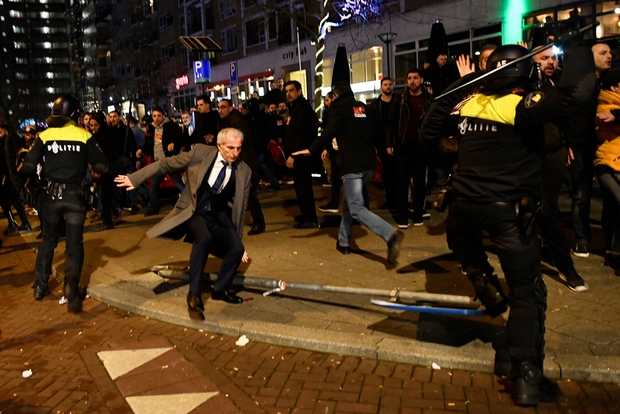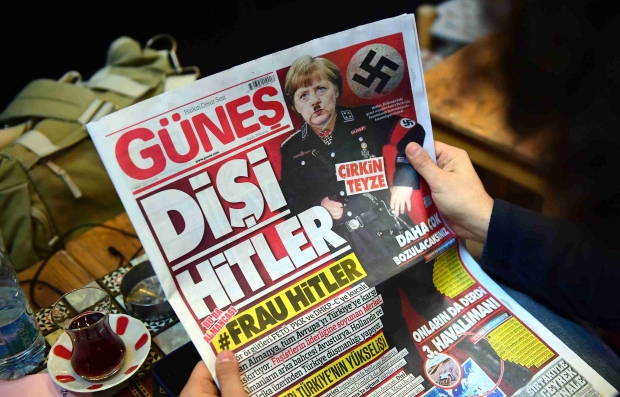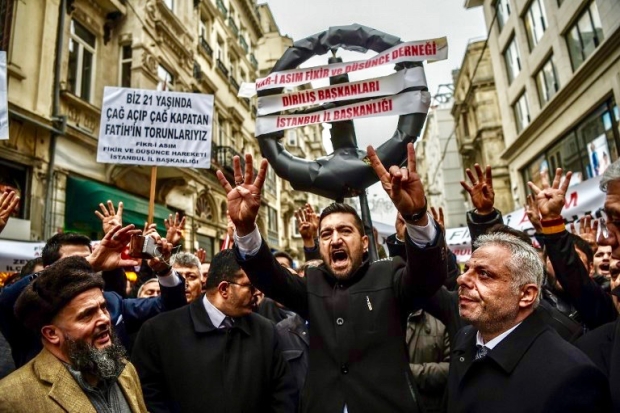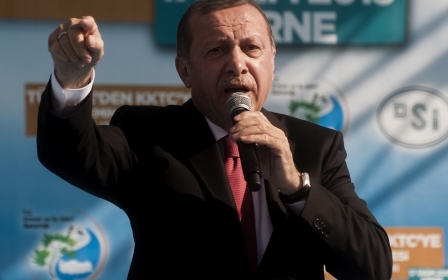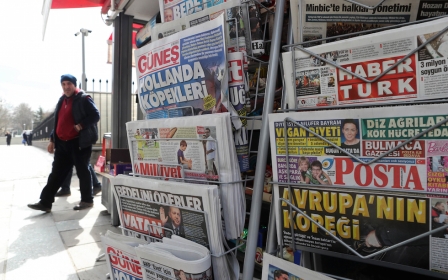Will Turkish anger at Europe hurt or help Erdogan's yes campaign?
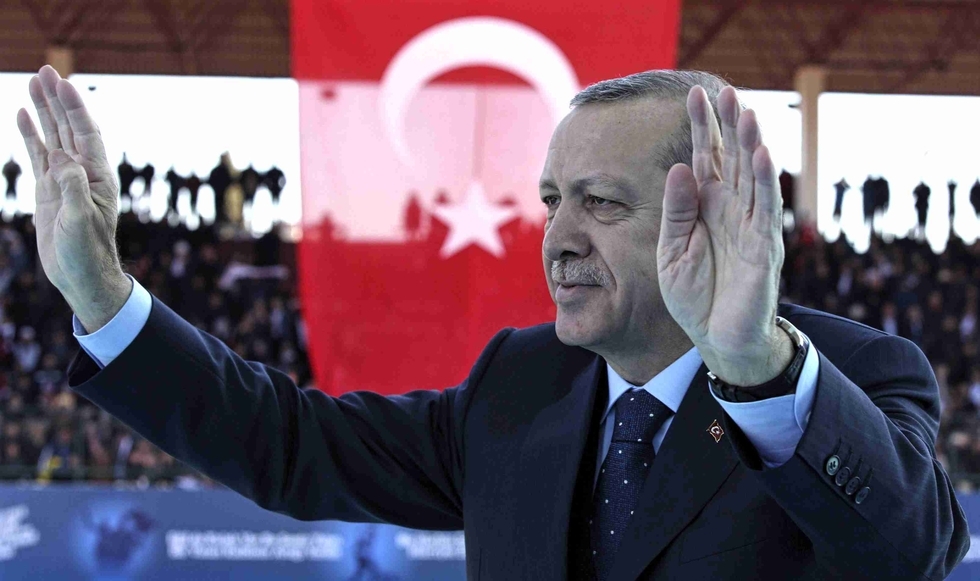
ISTANBUL, Turkey – Restaurant owner Iclal Kaplan and her husband watched with anger at how Dutch authorities treated fellow Turks this week.
Scenes of riot police in Rotterdam using dogs attacking protesters who were demonstrating against Turkish ministers being banned from the Netherlands filled them with horror. So the Kaplans decided to rename Amsterdam, the restaurant they have owned in the Anatolian city of Aksaray for 20 years.
'Our decision is a protest against how Turks were treated in Holland'
- Iclal Kaplan
“Our decision is a protest against how Turks were treated in Holland,” Iclal told MEE.
But nothing is straightforward in Turkey at the moment: a referendum on 16 April will decide whether to extend the powers of the president. Kaplan is furious at politicians for linking her renaming decision to support for the yes campaign.
"The politicians and media, trying to make it out as if our decision means we support a specific political party, is making me angry," she said.
"It has nothing to do with politics and will have no impact on how we choose to vote in the referendum."
Tension with western Europe
The couple are not the only ones who have been caught up, intentionally or otherwise, in a Turkish wave of nationalist frenzy about the hugely controversial actions of European nations ahead of the vote.
The referendum is expected to be tight, so Ankara is trying to court the nearly six million Turks who live in Europe, around a third of whom can vote in next month's poll.
But planned rallies involving the Turkish government and its Justice and Development Party (AKP) across Europe have been thwarted by Germany, the Netherlands, Austria and others.
In the Netherlands, the authorities denied landing rights to Turkey's foreign minister, Mevlut Cavusoglu, then blocked Fatma Betul Sayan Kaya, the minister of family and social affairs, from going to the Turkish consulate in Rotterdam before declaring her persona non grata.
A majority of Turks have condemned the actions of the Dutch government. Iclal said part of renaming the restaurant was because she "wanted to protest for the right of women. The way they treated the family minister is not the way to treat a woman."
On Friday a group of men, dressed in warrior garb and on horseback, greeted Prime Minister Prime Minister Binali Yildirim, currently on the referendum campaign trail, and asked to be allowed to ride towards the Netherlands, crusader style.
Even more bizarrely, a state-run husbandry institution decided to deport 40 Dutch Holstein Friesian cows in protest.
Why the 'Yes' campaign falters
Politicians have been trying to extract maximum political leverage from the mistreatment of Turkish ministers and sway voters towards saying "yes".
Just a few hours into the crisis, Huseyin Kocabiyik, an AKP lawmaker from Izmir, said in a television interview that the crisis would add two percentage points to the "Yes" camp and that Germany and the Netherlands deserved thanks for helping the camp.
Omer Celik, Turkey's EU affairs minister, also said “this stance has swayed undecided voters to decide in favour of 'Yes'” in response to Dutch actions.
Both Turkish President Recep Tayyip Erdogan and Prime Minister Yildirim have been calling on people to respond with a "Yes" to what they say are concerted Dutch and European actions to prevent a stronger Turkey from emerging.
But has the fresh wave of nationalist fervour and anger at Europe really had any impact? Some analysts are more guarded.Murat Gezici, of the Gezici polling company, in the latest poll conducted by the firm, wrote: "It would need at least 15-20 days to pass before sound research can be done on whether the problem with the EU has increased the Yes vote.
Usually renowned for its effective strategy, the AKP's campaign has failed to gather steam this time
"Initial findings show that the positions of the Yes camp have been strengthened and solidified by this, but there is no sign that undecided voters have been affected."
The Yes camp faces several obstacles. Aside from the consequences of introducing an executive presidential system and Turkey’s current economic stagnation, it is also hampered by a poor campaign strategy.
One is the absence of Erol Olcok, the AKP’s main campaign tactician, who was killed on Istanbul's Bosphorus bridge when he was part of the crowd that took to the streets to oppose the tanks during the failed coup attempt last July.
The other is the positive campaign being conducted by the Republican People's Party (CHP), which has deprived the AKP of being able to portray itself as the underdog and protector of the oppressed.
'Making more enemies will only make things worse'
Mustafa, a taxi driver in his late 40s, told MEE that despite being enraged at the actions of the Dutch he was not going to change his mind on the referendum.
"For a few hours I was very angry and even thought about voting yes. But then I realised they are different issues, and the Dutch are not to blame for my economic hardship," he said
'I will not allow anyone to insult the Turkish people. But what do the Dutch government and the Turks in Holland have to do with the referendum?'
- Mustafa, taxi driver
Mustafa said he would always stand up to the demeaning behaviour of Europeans as a proud Turk but he failed to see the benefit of making more enemies.
"I can barely take care of my family. I drive around for 12 hours and hardly find a customer. My debts are mounting. We have great roads, so what? I can't put a proper meal on the family table.
"The tourists are gone. People are so scared of an economic crisis they don't want to spend and don't use taxis. Making more enemies will only make things worse," he said.
"I will not allow anyone to insult the Turkish people. But what do the Dutch government and the Turks in Holland have to do with the referendum? It is us who get affected by the result. They [the AKP] have been in power for 15 years; what more do they want?"
But the signage reading "Amsterdam," where the husband and wife team have primarily been making and selling Turkish pides - a pizza-like dish - for two decades in Anatolia. That has gone.
Middle East Eye propose une couverture et une analyse indépendantes et incomparables du Moyen-Orient, de l’Afrique du Nord et d’autres régions du monde. Pour en savoir plus sur la reprise de ce contenu et les frais qui s’appliquent, veuillez remplir ce formulaire [en anglais]. Pour en savoir plus sur MEE, cliquez ici [en anglais].


